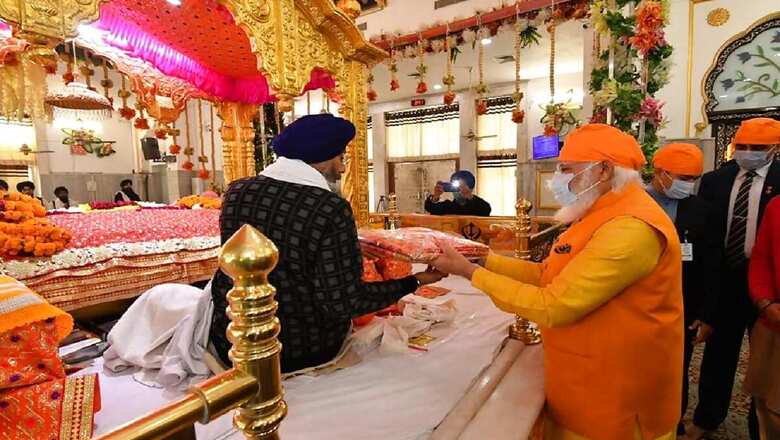
views
Prime Minister Narendra Modi’s well-publicised visit to Rakabganj Gurudwara is being correctly read as a personal outreach to the Sikh community, at a time when the BJP is on the back foot in Punjab, thanks to the farmers’ agitation against agricultural reforms and the split with the Shiromani Akali Dal (SAD).
The choice of Rakabganj Gurudwara, scene of mob violence in which two Sikhs were burnt alive in the presence of a senior Congress leader in 1984, is attributed to the PM’s frequenting of the gurudwara when he was posted in Delhi in the late 1990s. It serves, however, as a reminder of the 36-year-old pogrom that the Congress has yet to live down.
More to the point, it marks the beginning of a renewed BJP effort at mobilisation in Punjab. For over two decades, the BJP has failed to establish a foothold among the Sikhs in a state where the standard BJP playbook of nationalism, caste consolidation and poaching of prominent leaders is irrelevant.
The Modi factor works in Hindu-dominated constituencies (but nowhere else), as was evident in the party’s victory in Gurdaspur and Hoshiarpur in 2019. In Jalandhar, which also boasts a considerable Hindu population, it lost by a relatively narrow margin.
The state unit of the party has long held the alliance with the SAD responsible for its declining fortunes. For 25 years, it has been unable to increase its seat-share of 23 or its vote-share of 5-8 per cent. What’s more, it is losing its hold among the upper castes in urban centres. Two successive defeats of prominent BJP leaders, Arun Jaitley in 2014 and Hardeep Singh Puri in 2019, put a further strain on the SAD-BJP alliance.
The BJP has been unable to attract a single prominent face from among the powerful Jat Sikhs who have dominated post-Blue Star politics. Navjot Singh Sidhu came on board briefly, but quit after a quarrel with the SAD and crossed over to the Congress (only to become a headache for Capt Amarinder Singh).
Among those the BJP failed to woo, either for fear of offending its alliance partner or lack of interest on their part, is Captain-baiter and MP Pratap Singh Bajwa and Jagmeet Singh Brar, a once-powerful Congress leader who quit the party in 2015 and eventually joined the SAD.
Jat Sikhs, for all their economic, political and bureaucratic clout, comprise a fifth of the electorate, while dalits account for a third (albeit split between the Mazhabis and Ramdasia/Ravidassias). The BJP’s opportunity clearly lay in the violent tensions between the two communities, as a result of social discrimination in an ostensibly casteless society.
Accordingly, the Punjab BJP made strenuous efforts under its then president and dalit leader Vijay Sampla. The Rashtriya Sikh Sangat, which was blackballed by the Akal Takht in 2004, took up issues of concern to the Sikh community, such as blacklisting and justice for 1984, but to no avail.
The Mazhabis, while disenchanted with the Congress for its perceived tilt towards the better-off Ramdasia/Ravidassias, liked the BJP even less. The conviction of Dera Sacha Sauda chief Gurmeet Ram Rahim, who had mobilised dalits in Punjab and Haryana, as well as instances of atrocities against dalits in other states angered them further.
Lately, the BJP has been promoting Sikh faces such as RP Singh, Tajinder Bagga and Impreet Bakshi. It has inducted celebrities such as the dalit folk singer Hans Raj Hans and pop singer Daler Mehndi. Punjab BJP chief Ashwani Sharma has renewed efforts to woo dalits with stunts like the Dalit Insaaf Yatra, but these are unlikely to yield results.
Thus, PM Modi steps in to establish a direct rapport with Punjab’s electorate. He has the added advantage of the Kartarpur Corridor through Pakistan having opened last year, allowing Sikh pilgrims to pay homage at Guru Nanak’s resting place.
An influential section of Sikhs have always taken exception to the RSS’ insistence on clubbing them with Hindus and several sangh leaders in Punjab have been killed.
Regardless, Modi is likely to stress the undeniable cultural links between the two communities. Members of the sangh are fond of quoting V D Savarkar, who is said to have valorised the Sikhs as the best and bravest of the Hindu Race. But turning back the clock, to a time before identity politics, will be a tough challenge.
The author is a senior journalist. Views expressed are personal.
Read all the Latest News, Breaking News and Coronavirus News here




















Comments
0 comment